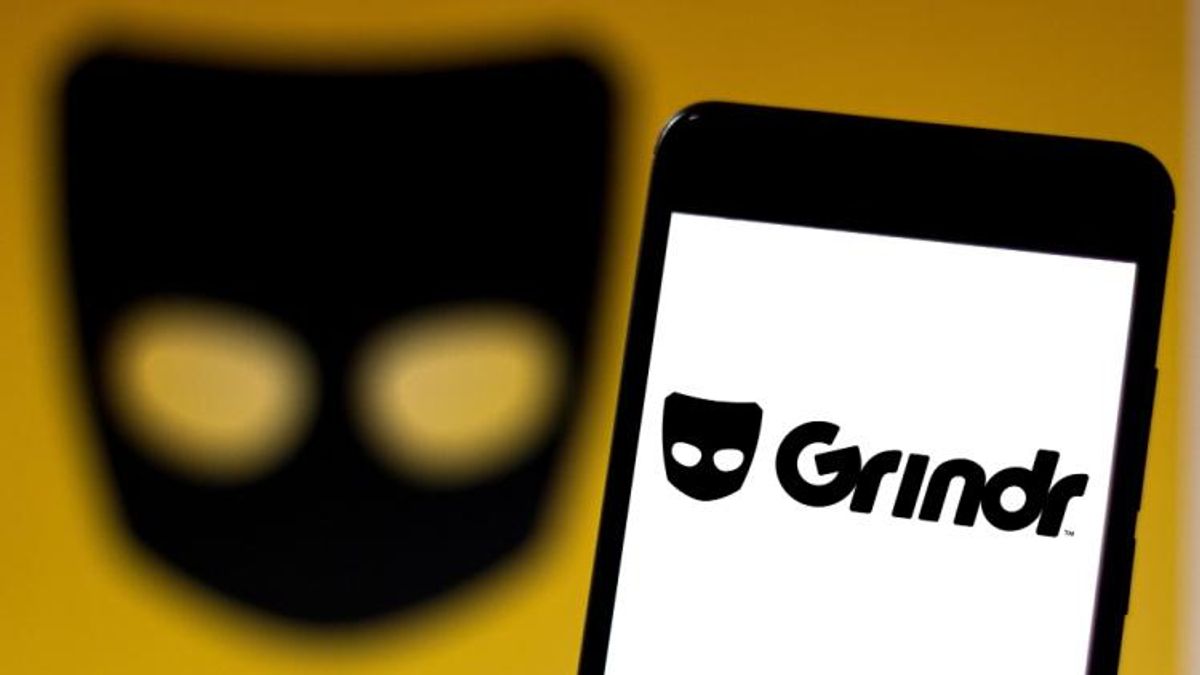I had a drama professor in college who was a bit eccentric. While he lectured, he rocked back and forth on his feet, hands in pockets. It didn't matter what the question he posed to the class was, i.e. "What was the underlying theme of the movie?" "What was behind the relationship of the two main characters?" "What was the subtext of the script?" It was always the same answer, and no one dared say it out loud. so he would stand up on his tippy toes, pull both hands out of his pocket, point his fingers to the air, and thunder "SEX!" "It's all about sex!"
I've never been on Grindr, but unless you live under a rock, everyone knows what Grindr is for and why it's been around for 13 years. SEX! No matter how you cut it, Grindr is a synonym for sex. Try as you might to put lipstick on a pig, it's still a pig. And no, that was not an intended sexualized pun.
If I was single and available, I'd more than likely be on Grindr. In fact, a study from a couple of years ago found that 84 percent of Grindr users have fallen in love. So it's probably not a stretch to say that it's a dating app, although that ranks a distance second to sex.
Grindr has bold intentions as it enters its 14th year of existence. It announced the hiring of a new CEO, George Arison, who was the founder and CEO of Shift Technologies, an online platform for buying and selling used cars. He's been on Grindr's board of directors since May. This is all part of Grindr's plan to go public.
Now, full stop. Recently, it was revealed that Arison could be a wolf in sheep's clothing, attempting to be a wolf of Wall Street by selling gay sex all the while trying to hide his past support of a true wolf who has taken bites out of LGBTQ+ progress.
Arison in the past has been vocal on Twitter about his support of Donald Trump, and Grindr users are threatening to delete the app as the result of the revelation. It would be easy to do, since there are a litany of other apps that can satisfy the needs of those looking for sexual gratification.
Here's what he tweeted during the presidential campaign in 2020:
"FYI I am a conservative & agree with some Trump policies. I think at least 10% of Republican voters and 1/3 of moderate independents are the same (like some Trump policies, can't stand having him in office). So Dems need a nominee who can tap into this electoral spectrum."
Now here's where it gets odd. Hours later, he tore into Trump:
"Re: politics// I view Trump as everything our Founders feared the most - which was a demagogue focused solely on self-advancement and self-interest. For that reason, ensuring that he is not re-elected is critical to our future."
A bait and switch? Well, it appears that Arison's tweets give a hint about what he and others are trying to do with the image of Grindr. It's a sex app. Whoa, not so fast. It's a dating app. It's a community app. My grandfather had a saying for people who flopped around on an issue: "You can't go to bed Catholic and wake up Jewish."
Having worked on a few initial public offerings as a public relations consultant, I can tell you that it is a laborious and meticulous process. It's all about properly positioning the company and getting lots of ducks to line up just so. For Grindr, this means tweaking its public image to be more than just a hookup app.
The company's website says it is "a location-based social networking and online dating application targeted towards members of the LGBT community." It does not say, of course, that it's the primary hookup mechanism for men, which back in my day was gay bars.
For sure, Grindr has had its share of problems, including affecting users' mental health, a lawsuit about sexual racism, and one that involved a man sending over 1,000 other men toward his ex-boyfriend. Buzzfeed reported in 2018 that the app was sharing users' location and HIV status with an outside party. And there's no doubt that MPV outbreak kept and still keeps many off the app.
Now, any company of prominence is bound to have lawsuits and issues with its customers. Think the airlines; however, when it comers to sex, Grindr is always in a precarious position. Craigslist, for example, shut down its personal ads in 2018 because of a law passed by Congress involving sex trafficking. At the time, Craigslist said in a statement, "Any tool or service can be misused. We can't take such risk without jeopardizing all our other services, so we are regretfully taking craigslist personals offline. Hopefully we can bring them back some day."
It hasn't yet, because who needs Craigslist when Grindr is so much easier and faster? There was a time, back in the day, when you hooked up on Craigslist and ended up partners, and you were reticent to say how you met. But times have changed, and Grindr has become such a fixture in millions of gay men's lives, so if you did meet on a sex app, most people just shrug their shoulders.
And after being around for 13 years, it will be a monumental task for Grindr to be known as anything other than a sex app. As a PR guy, I know that it's a tremendous struggle for companies to try to twist themselves into something they are not, or at least not known for. But that's what Grindr is being forced to do to some extent. It must soften itself for future shareholders, because making money off men having sex with men isn't something most investors would brag about. But then again, if they did brag about that, would most people just shrug their shoulders?
Cory Weinberg, the out senior reporter for The Information, one of the top technology media outlets in the country, and certainly one of the most preeminent when it comes to covering the executives and activities of Silicon Valley. Weinberg wrote a terrific piece this week, "Can Grindr's New CEO Sell the Gay Sex App to Wall Street?"
I asked Weinberg why Grindr is going public in the first place. "Its current owners, an investment firm run by former Goldman Sachs executive Raymond Zage, bought it for $600 million," Weinberg explained. "That was just two years ago. They brought in an almost entirely new management team, who improved the tech and workforce and financial profile over the pandemic. But Grindr had a ton of debt on its books as a result of the deal, and now this effort to go public is in part to pay off that debt."
OK, now to the heart of the matter: If sex indeed sells, is that why the Grindr IPO story is so intriguing to investors? "No, not really," Weinberg laughed. "There's an interesting dynamic -- and why a lot of The Information readers found this story interesting is there just aren't many well-known companies hitting the public markets for the first time this year. There was Getty Images, and there might be Instacart, and that's kind of it. The markets have been up and down, so investors have been wary of more unproven companies who might have more unpredictable stock. That's certainly a challenge for Grindr, which is introducing themselves to investors for the first time, really."
Since it is the first time that perhaps some investors are hearing about the company, is Grindr doing all it can to avoid the sex element of its story? "How executives tell the Grindr story is also interesting," Weinberg pointed out. "The company has real, actual profits, which is unusual for a tech company. But there's very little overhead with Grindr's business, it only has 170ish employees, and its revenue is mostly from subscription sales. Investors like those things."
How, then, does Grindr talk about the sex element? "There's obviously a lot to explain," Weinberg finally divulged. "It's not just about the gay sex part, which execs are kind of dancing around by calling it a 'dating app.' But also, the data privacy, law enforcement, and other complicated issues that come with running a global consumer app."
What about the app's consumers? Will things change for Grindr users because the company is trying to revamp its image? "The near- to medium-term plan definitely doesn't seem to involve changing much about how people use the app," Weinberg said. "I think they're trying to improve the rate of how many paid users there are compared to free users. They're trying to make it crash less and improve the basic functionality of the app. Execs want to paint a story about long-term future being about more than what is largely an app for people to meet for sex."
He added, "Don't get me wrong. People do meet for dates, friendships, etc., but it seems largely incidental, at least in big cities."
"I think it's pretty obvious what it is, but people have different experiences, and it could be something different if the company wanted," Weinberg emphasized. "But the design of the app and how it's been built seems for one purpose, and that's a means towards sex. Which is great and fine, for the most part.
"But it puts the question of how the gay world relates to sex in a new business light. For instance, a big statistic executives are touting is that users spend 61 minutes on the app every day on average. Is that good? That seems ... kind of unhealthy, at least for some people. But it's great for the business. That's a question we should at least be asking, just like we're asking about people being glued to TikTok."
In that vein, and as users threaten to leave Grindr because of its new CEO, will they drop the app and drop the hookup? Or will they just simply download another app and catfish Grindr?
John Casey is editor at large for The Advocate.
Views expressed in The Advocate's opinion articles are those of the writers and do not necessarily represent the views of The Advocate or our parent company, Equal Pride.


















































































